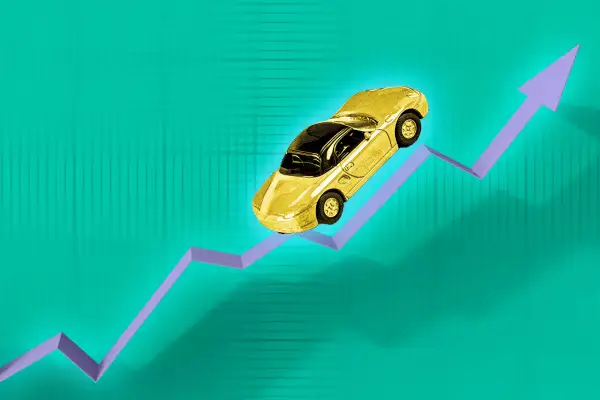3 Reasons Why New Car Costs Are Higher, Even Though Prices Are Dropping

New car prices are down 5.4% from the record high in December 2022, but that doesn’t necessarily mean it’s any easier to afford a vehicle.
High auto loan rates, soaring car insurance costs and rising gas prices are negating the relief that comes from lower prices.
In February, the average transaction price for a new vehicle was $47,244, which is a 2.2% decrease from a year ago and a more than $2,500 drop from the all-time high of about $49,800, according to Kelley Blue Book (KBB) data.
Car prices are down because new vehicle inventory is about 50% higher than this time last year, and that means car buyers have more leverage to negotiate prices at the dealership. Automakers have also improved incentives like cash rebates and subsidized financing offers.
However, car prices are still way higher if you compare the current average to the February 2021 level — before inventory shortages caused vehicle prices to skyrocket. (According to KBB, the average new vehicle price is up $6,600 in the past three years.)
"While everyone may applaud that prices are coming down, even marginally for the moment, affordability is still challenging the market," Erin Keating, executive analyst for Cox Automotive, said in a report, adding that incomes haven’t risen as fast as car prices.
Looking beyond vehicle transaction prices, many of the other costs of car ownership have gone up:
Auto loan rates
The average loan rate for a new vehicle purchase was 7.2% in the fourth quarter of 2023, which is a huge increase compared to the period before the Federal Reserve started hiking interest rate to slow inflation. Two years ago, the average auto loan rate was 3.9%, according to data from an Experian report earlier this month.
To put that in perspective, a buyer borrowing $40,000 for a new car purchase now would pay about $3,600 more over the life of the loan at the current average rate versus the purchase of a car for the same price in 2021.
Car insurance
Drivers are facing car insurance costs that are 20.6% higher than a year ago, according to the latest consumer price index (CPI) report. The CPI data shows that the average cost of a six-month policy increased by $138 in that timeframe, rising from $669 to $806, KBB reports.
Auto insurers are still working to enact rate hikes in many parts of the country as they deal with more costly claims, and some experts say that drivers can expect insurance prices to increase by about 10% in 2024.
Gas prices
Gas prices are the final factor driving up car ownership costs. The average gallon of gas costs $3.49, which is 21 cents higher than a month ago and 4 cents higher than a year ago, according to AAA. Until a few days ago, gas prices had been below year-ago levels for all of 2024, but that's now changed due to rising oil prices.
Gas prices typically increase in the spring as the weather gets warmer, so it wouldn't be at all surprising if the upward trend continues.
"Gasoline demand is rising as more Americans are getting out, combined with the summer gasoline switchover, which is well underway, and continued refinery maintenance,” Patrick De Haan, head of petroleum analysis at GasBuddy, said in a report Monday.

